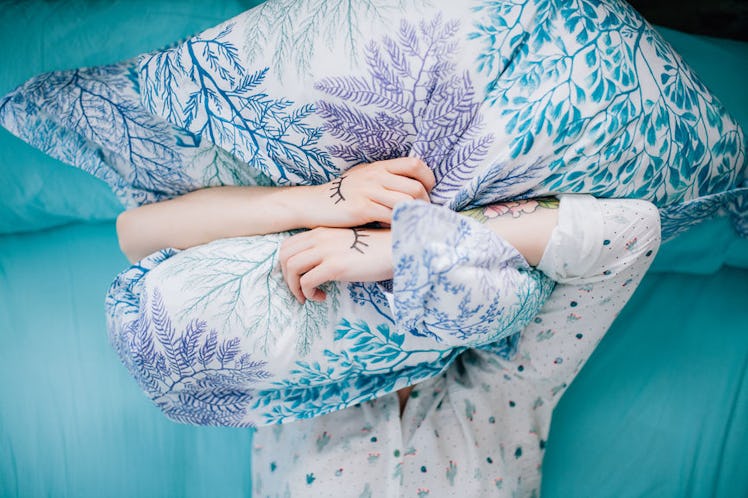
This Is Exactly How Much Sleep You Should Get When You're Sick, According To An Expert
I spent the last weekend traveling, and although it was fantastic to spend time in my hometown, when I got back to my apartment, I could feel it: the sore throat and cold starting to creep up. Determined to nip this thing in the bud, I went to bed a whole hour earlier than usual, but I still woke up feeling like I'd barely slept at all. So how much sleep do you really need when you're sick to make sure you're doing right by your body, and putting your immune system in a position to kick a cold to the curb as soon as humanly possible?
According to Erin Berman, a lifestyle and wellness expert for the mattress company Nectar Sleep, your bedtime can have a huge impact on how you feel when you're under the weather. Getting plenty of rest is crucial if you're feeling sick; in fact, Berman says, a lack of sleep may have been one of the things that led to your illness in the first place. "Sleep is necessary when it comes to your overall health and immune system function," she tells Elite Daily over email. "This is a huge reason why we tend to get sick when we’re already suffering from sleep deprivation."
If you're starting to notice some of first signs of a cold, like a congested nose or a tickle in the back of your throat, Berman says it's a good idea to give yourself extra time to sleep so that your body can recover as quickly as possible. Ideally, the expert explains, you want to try to adjust your schedule so that you can sleep as long as your body wants to. But, if it's a weekday and you're too busy to sleep freely sans alarm, Berman recommends shooting for an extra hour or two in addition to your regular amount. In other words, if you're normally clocking in around seven hours of sleep each night, try to bump it up to eight or nine, if possible.
What's most important, though, according to Berman, is that you let your body take the lead when you're sick. "I believe your body is always the best advocate for itself. Listen to your body and sleep as much as you can when you are sick," she tells Elite Daily.
Of course, if your cold or stomach bug is bad enough, you might just find yourself tossing and turning throughout the night without a wink of restful sleep. It's a frustrating feeling, but according to Berman, the quality of your sleep is just as important as the actual amount you're getting. "When you sleep deeply (undisturbed by any noise or aches and pains), you will go through your REM cycles without disturbances and allow your body to fully rest," she explains. Translation: Don't beat yourself up if you're lying in bed and trying, unsuccessfully, to fall asleep. Do your best to relax — read a book, listen to a podcast, whatever makes you feel mellow — so that, when your body does feel tired enough to doze off, you're able to do so immediately, without any stress or frustration standing in the way.
As for napping when you're sick, Berman says there are different philosophies about whether or not an afternoon snooze can really help you feel any better. But, if you're feeling awful in the middle of the day, she says it may not be a bad idea to catch a few hours of rest. "I think when you’re sick, a nap can be just what you need to help you get through the rest of the day without feeling too terrible and cloudy," she tells Elite Daily.
In addition to giving your body as much rest as possible, there are a number of things you can do around bedtime to both relax your body and soothe your sickness. For instance, Berman suggests making some herbal tea with extra lemon and honey to soothe your throat. And if you're feeling congested, she says, "use a neti pot (an ancient Ayurvedic method of cleaning your sinuses) to open your nasal passage before you sleep." You can also keep water and tissues on your bedside table, in case you wake up in the middle of the night and don't want to further interrupt your sleep pattern by walking around your apartment to blow your nose.
Bottom line: Whether you opt for an afternoon nap or you go straight to bed right after dinner, listening to your body really is key to feeling better.